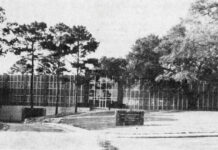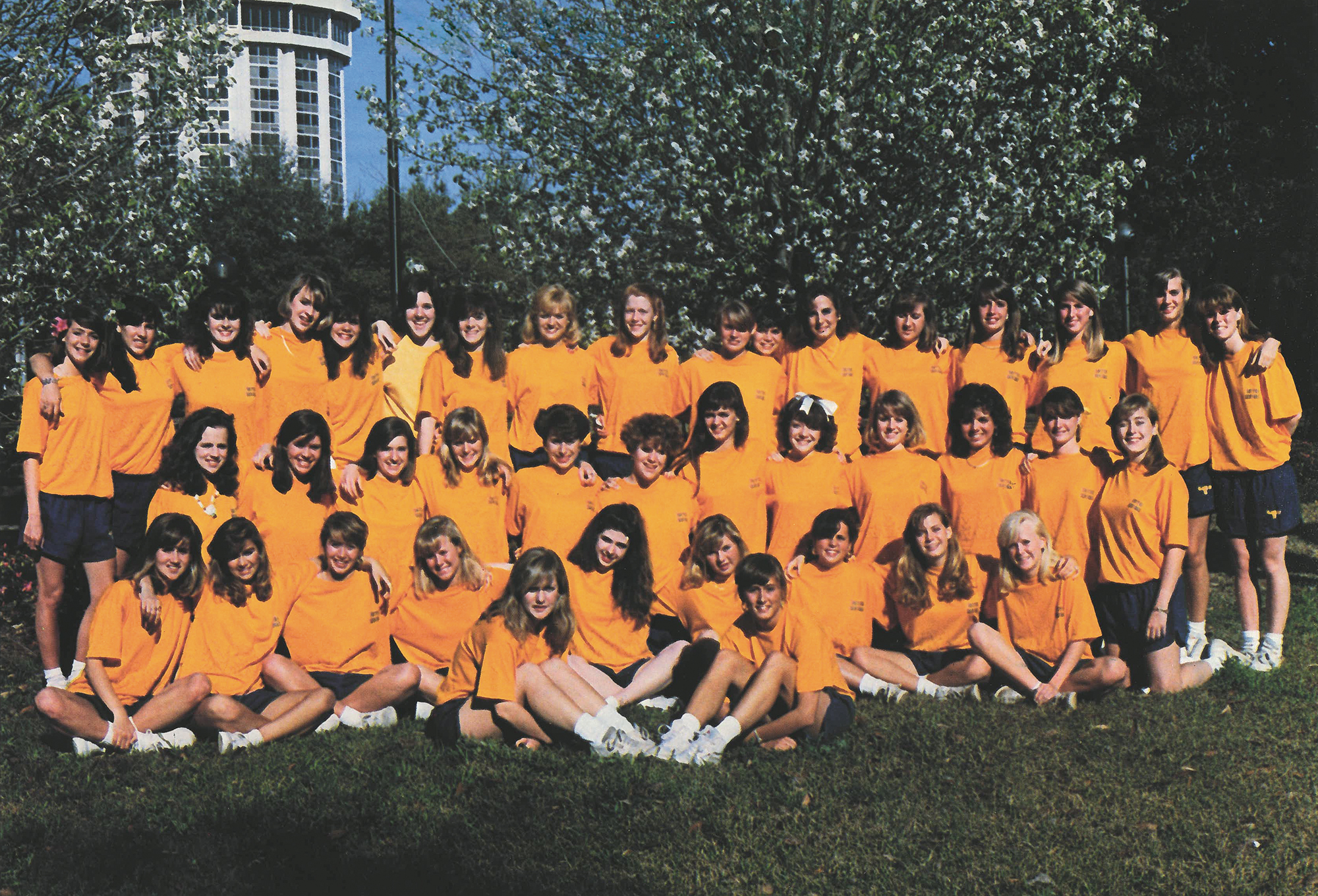
In Mobile’s educational history, few events were as significant or transformative as the merger between University Military School and Julius T. Wright College Preparatory School for Girls. For generations, the schools operated in parallel: UMS with its reputation as an all-boys school with a strict military structure, Wright for its all-girls environment marked by academic rigor and sisterhood. But behind the scenes, both institutions were facing financial strains, and combining resources seemed like the only viable path forward.
For the students, especially the young women in Wright’s final graduating class from 1988, the news was hard to take. They had grown up in a school defined by long-held rituals and a sense of sorority with their classmates. Having to combine with a boys’ military school stirred complicated emotions of grief, apprehension and curiosity.
Yet, something remarkable happened in the years that followed. What began as a merger born of necessity evolved into a partnership of possibility. Though the transition wasn’t without its growing pains, the two communities discovered compatibility. “As we came together, we began to see that what we had in common was much more important than any differences of opinion we had,” says former UMS-Wright Board Chair Dr. Robert McGinley. “There was some competition at the beginning between the boys and the girls. But over time, it’s worked very well.”
Students, teachers and families began to see past the old divisions and appreciate the strengths each school brought to the table. New connections blossomed, perspectives broadened and a collective identity emerged. Still, for many of the girls, it felt like something was being left behind. The intimacy of being in a space just for them couldn’t easily be replicated, and there was a sense of loss that came with the arrival of the boys.
We invited members of Wright’s final graduating class — Sullins Arendall, Fran Fields, Lucy Baker Green, Greer Megginson Helmsing, Sarah Bender Hon, Esther Beverly Jackson and Myrtle Robinson Milling — for a round-table conversation to reflect on being part of that moment of change, a school’s closing chapter and the beginning of a new story.

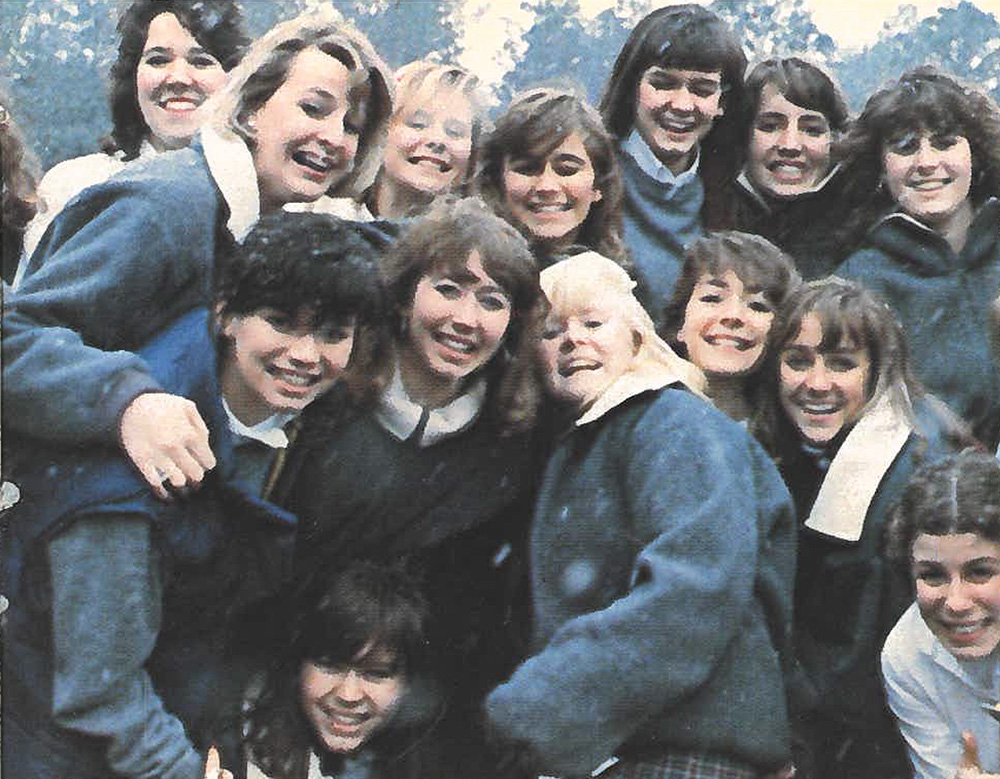
“Through the Years Our Motto Stands”
On the traditions, rules and sisterhood at Julius T. Wright Preparatory School for Girls
Jackson: We had a lot of traditions that I’m not sure work at coed schools. We had big sisters and little sisters, and we sang around the tree at Christmas time. The principal would read “The Night Before Christmas” with us, and we’d all wear bells.
Helmsing: Yeah, and we did skits and had dances, and we had an auction for people’s lunches and bake sales.
Milling: One thing I loved — do y’all remember that we had an all-school writing contest every year? And students from the art department would produce and publish a magazine, and they’d have a contest to see who could get in it and do the cover. It was cool to be smart. These things — they made me want to keep up and do everything other people wanted to do like being in the clubs or on different councils. The Honor Council was huge.
Helmsing: It was written in stone, and we signed it on everything we turned in. Do you remember the wording?
Jackson: “On my honor, I have neither given nor received help on this test.” And received was always hard to spell.
Hon: I thought it was longer than that, but okay. But we also had to stand when a grown-up entered a room and everything had to be tucked in. Blazers on Thursdays. You could get a demerit if your socks weren’t pulled up.
Jackson: I got a demerit because I was in Miss Lillie’s room and she said that there was an emergency phone call for the principal, but he was headed out of town and she needed me to run catch him. So, I ran down the hall, ran down the hill by the gazebo, and Mr. Hamner gave me a demerit for walking on the grass. I told him it was an emergency, but he said I still shouldn’t have walked on the grass. Today, I still look at grass and think, “I shouldn’t walk on that.”


Milling: He referred to us as ladies. You remember that? Everybody referred to us as ladies. Even in kindergarten, they’d say, “Ladies, line up.” It kind of felt like you had to rise to the occasion.
Helmsing: Rise to our potential. That’s right. But at the same time, we weren’t trying to impress anybody. We didn’t want to wear makeup or anything because, you know, we didn’t care if we were just going to be with our girlfriends.
Jackson: Yeah, we didn’t need to be fancy. But do y’all remember the food kind of was? We’d have things like broccoli with hollandaise sauce. I mean, really, we had hollandaise!
Milling: But then we had fried chicken crumbs. It was a dime for a bowl, and it was just the crispy stuff left over at the bottom of a pan of fried chicken. It was a dollar if you got it with the mashed potatoes. Everybody would line up. Do y’all remember some of the dads coming to school on fried chicken day or spaghetti day? Our parents used to come have lunch with us. And teachers would sit down with us too. You never knew if they were going to come to your table and pop down next to you.
Jackson: I don’t remember that, but I don’t think I would have liked that.
Milling: I’m telling you, I think that’s why our classes were so close. People just sat down at tables wherever and with whoever.
Jackson: We had a great headmaster. He came from Montgomery, and every last day of school, he would come out of his office and ring a bell. We’d all run out of our classrooms and follow him all around. I don’t know, but I don’t think you could have done that at a combo school.
Arendall: You know what else was different? If you wanted to be on a team, you just showed up. You got a uniform and at least sat on the bench. That was the best.
Fields: It really was. There’s no other way to say it: it was a family. It was small enough to know everybody, but it was also girls just getting to be girls. Besides having that experience of being at an all-girls school, there’s no way to replicate that.
“Old Will Change to New One Day”
On sharing a classroom with boys for the first time
Jackson: I was sad about the merger. We had an amazing school — such cool traditions, and it wasn’t going to be the same when the schools came together.
Milling: Well, the environment was so different. You know, I heard a funny story about the first day of class after the merger. The mothers’ committee from Wright arrived at UMS with all these decorations and silver platters and things. They were all polished and just so. The UMS people asked, you know, “What are these for? What do you do with these?” They told them, “Well, we used them for mother-daughter teas, and when we decorated the Christmas tree, we would put the cookies out on these.” And UMS was like, “Yeah, we don’t have anywhere to put these.”

Helmsing: Oh, I remember having the cookies out at Christmas! But, yes, that’s how different the cultures were. The boys just didn’t do things like that.
Hon: They said they were just testing out what a merger would look like during our senior year. As far as I know, we didn’t know a decision had officially been made. Their plan was to kind of do stair steps. I don’t think we as students knew about the decision to merge until spring. They’d send some of us to UMS for class in the mornings and some of the boys would come to us. They just let us drive back and forth between schools. Can you believe that? And we’d tease each other and throw stuff at each other. But it was fun. I remember getting into tomato fights on Old Shell Road.
Fields: But there weren’t many of the boys that came over to us.
Milling: But they always had food, and I was jealous. They got to go to the cafeteria and get their biscuit, and we’d get in trouble for it! Our class was from 8:00 to whatever — I think it was 9:40. And the girls had to scurry out the door and had approximately 20 minutes to get to class. Absolutely no stops for hunger pangs.
Jackson: But we had study hall one day a week right after the break. Do y’all not remember that? It was in the senior lounge.
Helmsing: That’s right! We could skip study hall, couldn’t we?
Green: I don’t know if we could, but some of us did anyway. When we were seniors, we could do a lot more. We could take our lunch to the senior lounge or sit outside and order a soft drink with nobody else from the other classes. I don’t know if the boys got to do that over at the other campus, but we loved it.
Jackson: I didn’t like going over there. Our facilities were state-of-the-art. And we were so well-behaved in the classroom and listening and taking notes. They were used to being, you know, boisterous boys.
Milling: The first day, I remember walking in, and we were so nervous. We all met outside and went in together. The boys did things like lean with their backs to the lockers and put their feet out to try to trip us.
Arendall: I was petrified to go. We’d never been to school with boys. When I went to Auburn, that was the first time I’d ever been in class with a boy.
Helmsing: But we knew a lot of them from going to football games and seeing them around, and we got to know each other better and became friends.
Hon: I remember being kind of sad because we were on yearbook and didn’t get to go over with everybody.
Green: I remember that too. I felt like everyone else gained some new friendships, and we didn’t really get to in the same way.
Milling: I don’t feel like I did as much. We just sat in our single front row and really didn’t talk. We had some younger people in our classes, and I feel like they got to be good friends. My husband was the year behind me in school, and he talks about me being in his class, but I really don’t remember him being there.
Fields: We definitely started to be more conscious of what we looked like in the morning, going over to UMS.
Milling: There’s a short write up about it in the yearbook. It says “School is hip, dude, even though the boys are rude. I had to buy a new tube of lipstick.” From Muriel Foster.
Green: For real? That’s too funny. I would love to know what the boys thought about it all. I think they liked it.
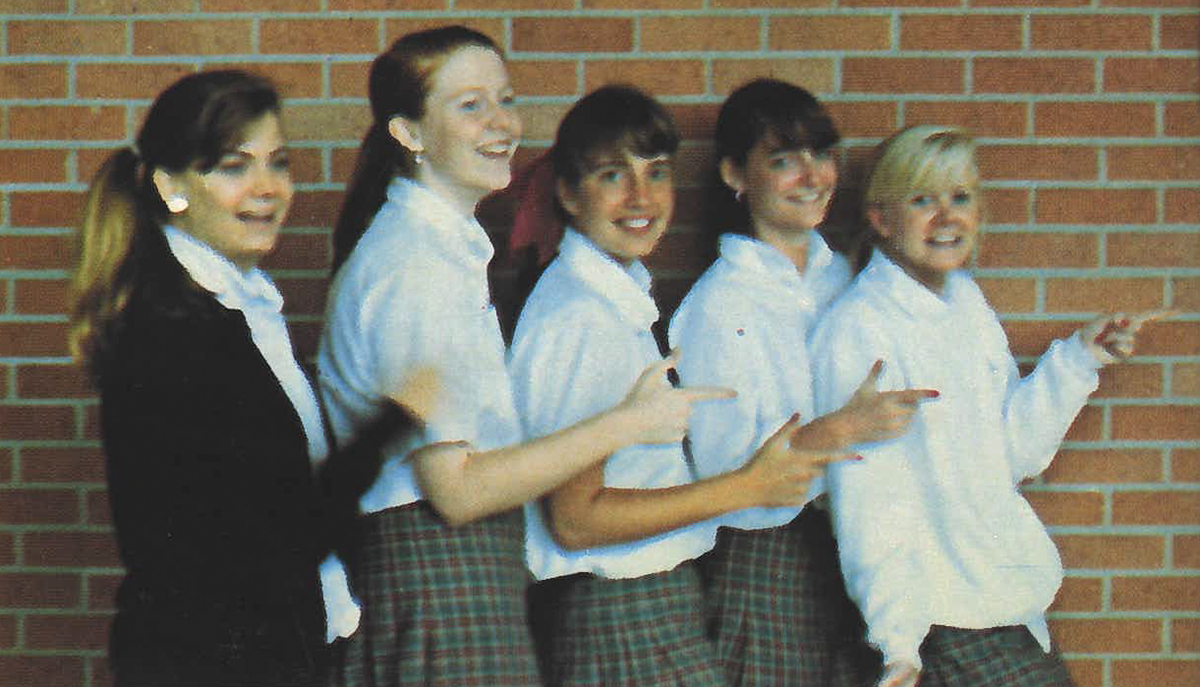
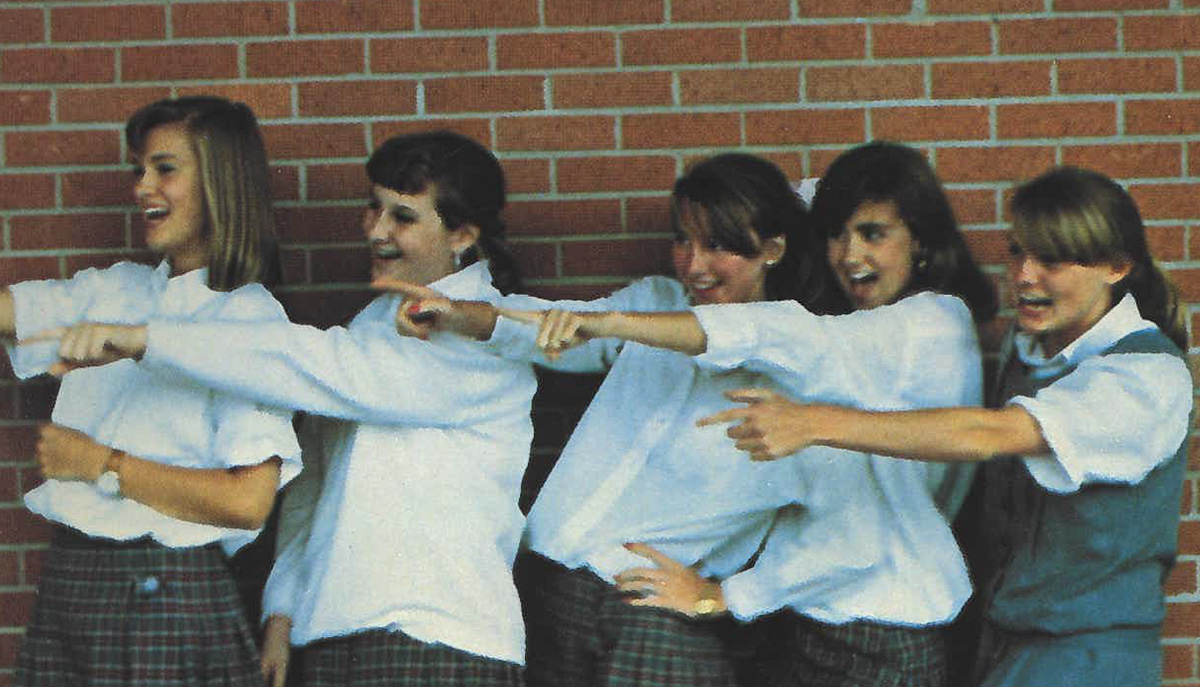
“But Our Happy Memories Stay”
On lasting memories and the legacy of Julius T. Wright
Jackson: How could I explain what it was like? I don’t have all the synonyms for how special it was — all the love and the confidence we had and being proud of ourselves. We have lifelong friendships from it.
Milling: I haven’t seen some of my friends from school in several years, and I feel like it doesn’t even matter. We’ll have friendships that will last forever. After we were married, my husband and I still had Mr. Hamner to dinner several times. He couldn’t drive, so we’d go pick him up. Miss Gholston was invited to my wedding.
Green: Well, they were family. It was sad for us because we knew that what we had could never be replicated again.
Helmsing: It was the end of an era. We were all so attached to it
Hon: I get a little pain in my chest when I drive by the school.
Jackson: I live in Orange Beach, and if Wrights was still around as an all-girls school, I would have done anything to send my daughters all the way over to Mobile to go. I don’t know how. But I would have made it work.


